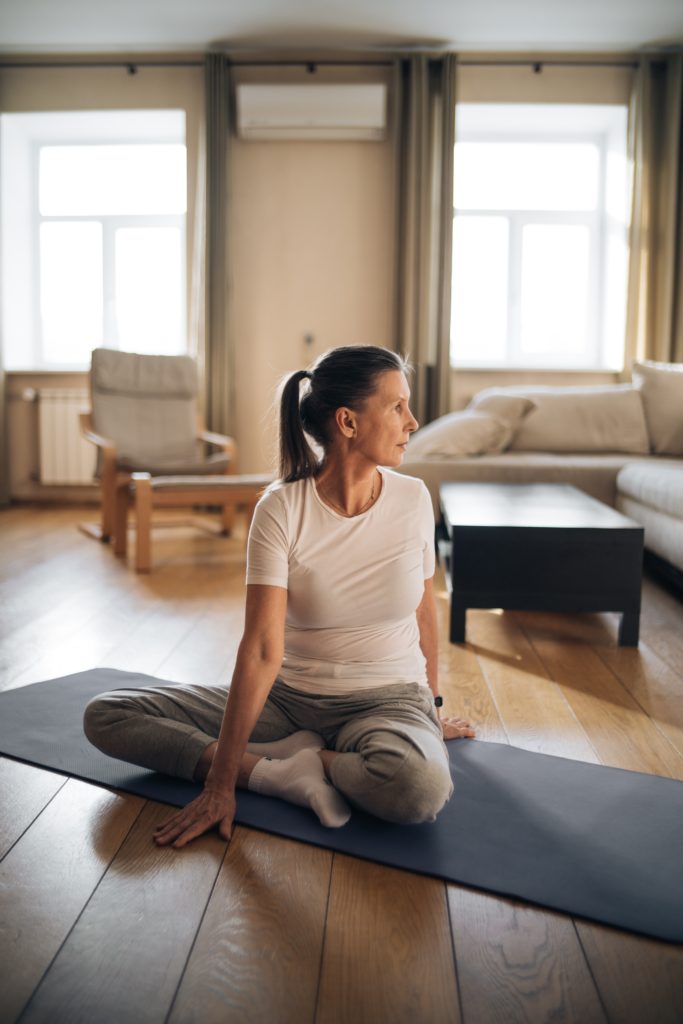“We need to feel beautiful from the inside out and not the other way around”- Maria Vazquez Castro
As I stated in my initial posts, the process of aging is not an easy one for me. I admit that I wouldn’t say I like getting old. Some women come to a peaceful place with their changing bodies and faces; I am not one of those women.
Anxiety about aging shows up as early as the 30s for some, and it changes as we go on through the years.
This is a topic that interests me greatly, so I decided to explore it. I need to learn to let go of that resistance. After all, the process of aging is a gift. Making peace with getting old has become one of my missions. My goal at the end of the journey is to find a place of total acceptance.
This article will go a little deeper into the concept of the acceptance of aging. I will try to guide my readers on how to learn to make peace with getting old. It is more complex than we are made to believe. I know for sure that for me, it won’t be an easy task.
I think that the best approach is to face up the process of aging naturally. We need to remember that getting old is simply another phase of life. Many factors come into play for a woman’s body (and face) transformation. Hormone changes brought by menopause are to “blame” for our bodies morphing into what I call “post-menopausal” new me.
For most of us, women in our fifth decade, this constantly morphing body is not easy to come to terms with. So, your body is aging, your middle-aged middle is budging, oh, and those sleepless nights, not to mention losing bone density. It would help if you told yourself that you must make peace with all of it. Keep reading!
The truth is that menopause is a powerful time of spiritual awakening, an opportunity for transformation. And this is the approach to my aging body and face that I want to propose to you.
We all need to rewrite the cultural story about aging, particularly for women. We should pause and rewire the western culture messages that have been “tattooed” in our brains. Western culture glorifies thinness and youth in women.
The way aging is viewed today is very different than previous generations.
According to aging expert Helen Kivnick, Ph.D., a psychologist at the University of Minnesota, “the experience of later life is determined partly by biology, partly by history, and partly by society and culture. Never before in history has the phase of later life had the potential to be so long and fruitful. Old age as we know it is very new and doesn’t look at all like it used to.”
People live longer and with greater independence; they can plan for their futures more actively. In other words, old is not what it used to be. It’s not only that we tend to keep our health longer; It’s that we also aren’t subject to generational restrictions on behavior, clothing, or choices.
A fit 55-year-old woman today can dress like her adolescent daughter (think jeans and a sweater), and particularly from behind, you could not really tell the difference. Middle-lifers tend to be open to new ideas and new experiences. In short, mid-life is far from being the end of it all. People reinvent themselves, start businesses, go to college, re-marry, you name it.
Still, most of us women don’t seem to have found a sense of contentment with our aging bodies.
According to the article Getting over getting older published in Psychology Today, “What is about aging that makes our sagging skin crawl? Are we frightened of looking and feeling old because it reminds us that we are mortal?
These questions bring us back to the way the western culture looks at aging. So here come my questions:
Does attitude make a difference? Are we indeed as old as we feel?
How we are old depends very much on how we are young.” Helen Kivnick
Let’s reject the fears, stereotypes, and caricatures of aging that current society dictates us. I couldn’t say it enough times; we need to love ourselves more, to take care of ourselves.
The interplay of chronological age and physical health is much stronger than we tend to realize.
Says Renee Garfinkel, Ph.D., a psychologist and aging expert from Silver Springs, Maryland, “We associate aging with disfunction. If you aren’t in good health, it’s very hard to think young. But if you think young, have good genes, and take care of yourself, you’ll probably feel and seem younger than you are.”
In fact, believing yourself to be in better than normal condition for your age is typical for healthy people in general.
So here comes my next question:
Am I old yet?
Studies suggest that people tend not to feel downright old, no matter their age.
We need to remember that getting older is a generally positive thing. We don’t just accumulate years; we also gain wisdom, enabling us to make decisions with less of the fussing that marks our teens, 20s, and even 30s.
As we get older, we know more about ourselves. We have better attention spans and an increased ability to focus.
According to clinical psychologist Forrest Scogin, Ph.D., of the University of Alabama, “In general, most non-neurotic older people are content with what they’ve done with their lives, are happy, have high self-esteem, and a sense of well-being.” Additionally, we become more adaptable and flexible. Rates of depression tend to decline after the age of 45 as well, for both men and women.
So, what’s the fuss with all of us women assimilating the fact that we are getting old?
From my research on this topic, this is what I came up with; we may not look as fresh-faced, but we like ourselves more. We think fewer negative thoughts. Life becomes simpler. Our priorities shift in a healthy and adaptive fashion. We, women, become more assertive and active in meeting our own needs. Moreover, relationships in later life tend to become more important, satisfying, and mutual.
The concept of better not older
This is the goal I want to achieve at the end of the journey of acceptance. Is it wrong to cheat or help nature alone, to try slowing down the erosion of time? Of course not.
Dying your hair or having collagen injections doesn’t really have anything to do with avoiding getting older per se. Instead, it’s about wanting to feel good about yourself and feel attractive. But we need to be careful; if a woman values her attractiveness to the exclusion of other personal traits, then she loves herself from the outside in rather than the inside out, and that’s a problem.
We should also remember that one of the most important parts of getting older is to continue giving to others. Engaging actively with family and friends is the answer to a happy life.
Steps to make peace with an aging body
The following steps are not quick fixes; they require that you go underneath the surface and work on yourself from the inside out. However, if you achieve the end goal, the result can lead to beauty that lasts a lifetime.
- Acknowledge and accept what is. The first step toward making a change in perspective is acknowledging and confronting the issue.
- Be present with whatever emotion arises with this acknowledgment and feel and own those emotions. It’s about coming out of hiding, from behind beliefs and actions that disconnect us from what we really feel.
- Forgive yourself for any actions from the past. Then, talk back to that internal dialogue that (for many of us) shouts, “you look old,” “you look tired,” “you look terrible.” It’s time to quiet down those voices that get in our way.
- Interrupt unhelpful, negative thoughts. Aging requires flexibility, accommodating, and accepting the “I” of the beholder, and that is you.
- Compliment yourself every day. Bonus points if you say it out loud.
- Remember who you really are. You are much more than a body. We need to say goodbye to the “good ole days.” It isn’t easy, but with dedication, it’s very possible.Says Vivian Diller, Ph.D., a psychologist in private practice in NYC, “Rather than striving to revive images of old selves to try to stop a natural biological process, we can move on.”
The bottom line
It’s time for us to take a break and go within. Stop judging our negatives and be happy with our aging bodies and all they can do each day. It’s crucial to learn how to appreciate our beauty from the inside out and not the other way around.
After all, according to psychology, getting used to our aging body is something we are supposed to achieve, eventually. But everyone must do this in her own way.
There is no time better than the present for beginning to imagine an enjoyable, wise, active, and fruitful later life. Such planning can only add richness to the middle years as well. We can start by accepting our aging bodies, can we not?

